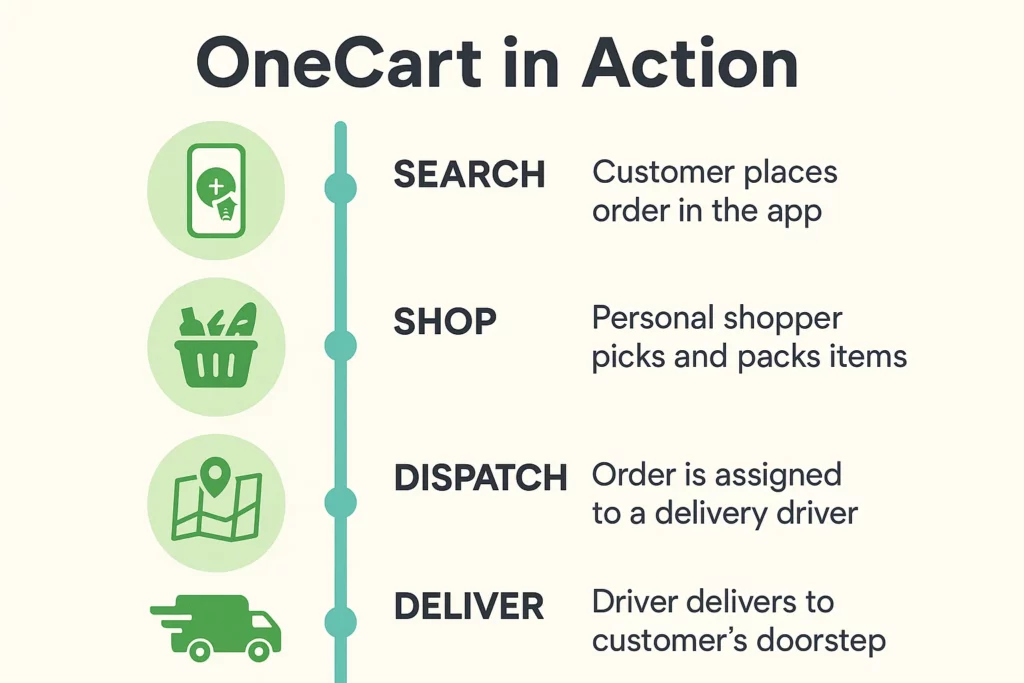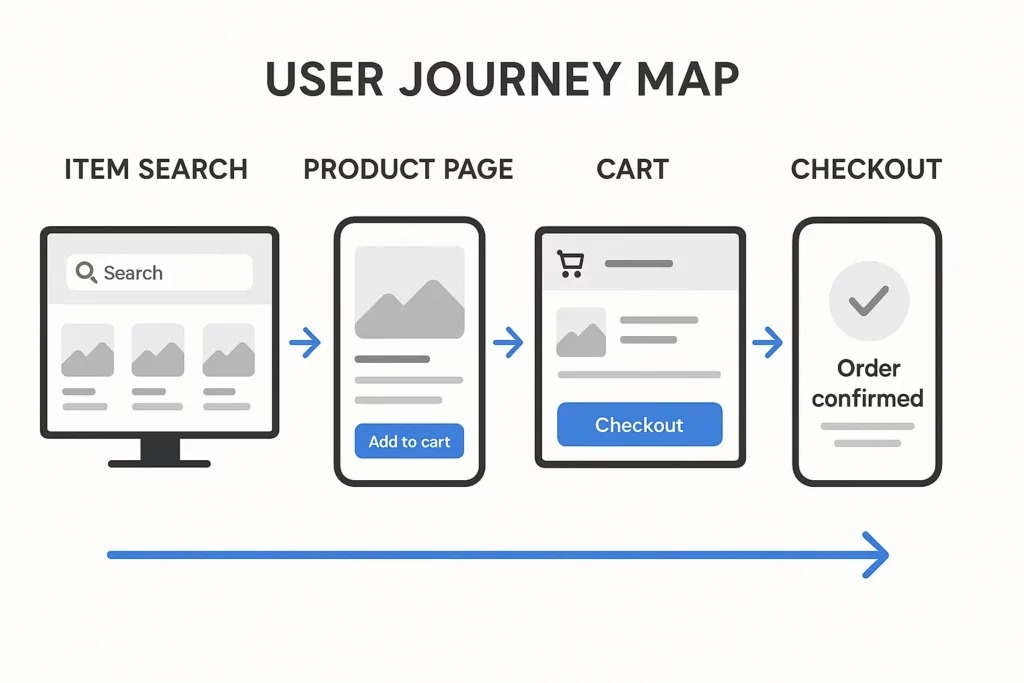Ever found yourself juggling Slack notifications, a startup pitch deck, and—oh no—your fridge is emptier than a VC’s inbox post-funding season? Yeah, we’ve all been there. You need milk, coffee, oats… and zero time to run to the store. Enter OneCart—the grocery genie that delivers everything you need with just a few taps.
For entrepreneurs and digital creators, time isn’t just money—it’s survival. Whether you’re coding in your pajamas or hosting a late-night brainstorm session, OneCart steps in like your personal shopper with superpowers. It’s not just an app; it’s a lifestyle upgrade wrapped in UX.
And here’s the kicker: startups like OneCart aren’t unicorns from another planet. With the right partner (hint: Miracuves), you can build, launch, and scale your very own version. But let’s first understand how OneCart works its magic.
What Exactly is OneCart?
OneCart is a multi-retailer grocery delivery app that lets users shop from various local supermarkets, pharmacies, and specialty stores—all in one order. Think of it as Uber Eats meets Instacart meets your neighborhood store, all synced into a single interface.
It originated in South Africa and quickly scaled by solving a real problem: fragmented grocery shopping. Users can search for products across retailers like Woolworths, Pick n Pay, Dis-Chem, and others without hopping between apps. OneCart aggregates the shopping experience and then dispatches personal shoppers to fulfill the order.
Partner with a reliable grocery delivery app development company to launch a OneCart-style platform packed with real-time inventory and multi-store support.

How Does OneCart Work? Step-by-Step Breakdown
Let’s break it down like you’re reverse-engineering it for your pitch deck:
1. Retailer & Product Discovery
- Users log in and enter their delivery address
- App displays nearby partnered retailers based on location
- Products are categorized (fruits, bakery, dairy, meds, etc.)
- Real-time inventory sync from stores
2. Order Placement & Cart Consolidation
- Users can mix items from multiple stores
- OneCart auto-splits the order per vendor
- Final cart shows subtotal, delivery fees per store, ETA
3. Personal Shoppers & Fulfillment
- Trained shoppers pick products in real time
- Substitutes available if items are out of stock
- Shoppers can chat with users for item clarifications
4. Last-Mile Delivery & Tracking
- Orders are bagged and assigned to delivery drivers
- Users get live tracking and delivery confirmation
- Digital receipt sent post-delivery

Why OneCart’s Model Works (And What Startups Can Learn)
OneCart didn’t invent grocery delivery. It just refined it. Here’s what gives its business model real bite:
1. Marketplace Aggregation Power
Multiple vendors = more options = higher cart value. It’s classic multi-sided platform economics—value increases with more participants.
2. Revenue Streams Galore
- Delivery fees
- Commission from retailers
- Subscription (OneCart+)
- Promoted listings for brands
- White-labeled B2B logistics
3. Hyperlocal Edge
OneCart wins because it plays the hyperlocal game well. Unlike global giants, it understands local delivery challenges, partnerships, and language preferences.
Explore how OneCart earns revenue through delivery fees, service charges, and partnerships with grocery retailers.
Tech Stack Behind OneCart (And Your Future App)
If you’re building a OneCart clone, here’s what you’d need in your tech toolkit:
Frontend (Customer)
- Flutter or React Native (for Android + iOS)
- Clean UX with predictive search, filters, barcode scan
Backend (Admin + Vendor)
- Node.js or Django
- Real-time inventory API integration
- Multi-vendor dashboard, order routing logic
Infra
- Cloud hosting (AWS / GCP)
- Firebase for real-time messaging
- Twilio for shopper-user chat
Explore the top-rated OneCart clone scripts of 2025 — compare key features, customizability, and pricing to launch your grocery delivery platform.
OneCart vs Instacart vs BigBasket
| Feature | OneCart | Instacart | BigBasket |
|---|---|---|---|
| Multi-retailer cart | ✅ | ❌ | ❌ |
| Hyperlocal targeting | ✅ | ✅ | ✅ |
| Personal shoppers | ✅ | ✅ | ❌ |
| Retail partnerships | Regional | National | Owned inventory |
Future-Proofing the OneCart Model
Dark Stores & Micro-Warehousing
To optimize delivery speed and SKU availability, OneCart-like models may invest in dark stores—small fulfillment hubs in dense urban areas.
AI-Powered Recommendations
As grocery personalization becomes the norm, AI engines will suggest bundles based on purchase history, dietary habits, and even local weather.
Wallets & Instant Checkout
Mobile wallets, UPI, and crypto integration could simplify payments further. Checkout friction = cart abandonment = lost $$$.
Explore the marketing strategy that fuels OneCart’s growth and uncover the full-stack development approach behind building a OneCart-like grocery delivery app.
Conclusion
OneCart isn’t just a grocery app—it’s a case study in efficient, scalable, and user-centric design. It delivers groceries, yes—but also convenience, sanity, and more minutes back in your day.
For startup founders eyeing the next delivery unicorn, building your own version of OneCart isn’t just possible—it’s profitable. Especially when you’ve got the right partner in your corner.
At Miracuves, we help innovators launch high-performance app clones that are fast, scalable, and monetization-ready. Ready to turn your idea into reality? Let’s build together.
FAQs
What is OneCart used for?
OneCart is used to order groceries and household items from multiple local retailers in a single app. It lets users shop smarter, faster, and with less hassle.
Can I shop from more than one store?
Yes! That’s OneCart’s main USP. You can fill your cart with items from various partnered retailers and receive them in one consolidated delivery.
How does OneCart make money?
It earns via delivery fees, commissions from retail partners, subscriptions, and premium placements. It may also monetize logistics for B2B players.
Is OneCart available globally?
Not yet. It’s primarily focused on South Africa but the model is replicable in other regions with similar market dynamics.
How long does delivery take?
Delivery times depend on store location and order volume, but most deliveries are fulfilled within 60–120 minutes.
Can I build a OneCart clone for my region?
Absolutely. With the right development team like Miracuves, you can customize features, integrate local vendors, and scale your own version quickly.








